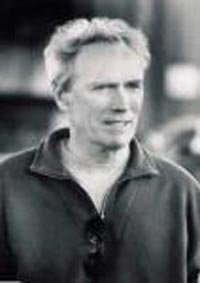
Tall, soft-spoken, leathery leading man since the 1960s who diversified into directing and producing after achieving iconic status. Clint Eastwood arose from the world of TV Westerns to become the number one box-office star in the world, subsequently earning critical acclaim as a director. His production company, Malpaso, crafts moderate-budget features that range from the bluntly commercial to the impressively personal and ambitious. Eastwood is not entirely part of the Hollywood establishment; his business is run out of Carmel, California, on the Monterey Peninsula, where he has served as mayor and run a restaurant.
Eastwood grew up in California, where his parents were itinerant workers. After high school, he worked as a lumberjack in Oregon, played honky-tonk piano and was a swimming instructor in the US Army. On the GI Bill, he studied at Los Angeles City College. Signed by Universal, he had his first experience with the indignities suffered by actors in a movie, Francis In The Navy (1955). Later, he moved to New York and gained recognition as the trail boss Rowdy Yates in the successful TV series ‘Rawhide’ (1959-66).
Tight TV schedules and good training helped him develop the minimalist acting style for which he is famous; it was first appreciated in Europe, where he starred in a trilogy of spaghetti westerns directed by Sergio Leone in Spain. Sinewy, laconic and lethal, he embodied to Europeans the maverick, unpredictably violent American, whose philosophy in A Fistful Of Dollars (1964) was “everybody gets rich or dead.” For A Few Dollars More (1966) and The Good, The Bad, And The Ugly (1966) became classic revisionist Westerns and made Eastwood an international star. He returned stateside and starred in Coogan’s Bluff (1968), a smart urban Western that marked the beginning of his long and successful collaboration with director Don Siegel.
Eastwood’s second famed screen incarnation was ‘Dirty’ Harry Callahan, the cop of Don Siegel’s Dirty Harry (1971) who found it easier to shoot suspects than interrogate them. Hence Harry’s immortal line in Sudden Impact (1983) when a crook threatens him: “Go ahead make my day,” calmly intoned from the responsible end of a massive handgun. Nonetheless, these films were sufficiently ambiguous to defy easy ideological categorization.”
Eastwood became a fixture of masculine action fare but he also fared well in several popular comedies, such as Every Which Way But Loose (1978) and Any Which Way You Can (1980). Though he could have coasted on his established persona, Eastwood chose to take chances with his material and subjected his image to thoughtful and not always flattering scrutiny. His portraits of tormented men with intense inner lives and little ability to communicate with others found an apogee in Bird (1988), his moody, acclaimed portrait of jazz musician Charlie Parker. Virtual ‘auteurist’ control has enabled him to make unusual Westerns (High Plains Drifter, 1973; Pale Rider, 1985) and cop movies exploring feminist concerns (Sudden Impact, 1983; Tightrope, 1984).
Eastwood’s commercial viability seemed to be in marked decline by the late 80s. The fifth ‘Dirty Harry’ movie, The Dead Pool (1988), was far less successful than its predecessors. 1990 saw the box-office failures of both The Rookie, a formula cop outing, and White Hunter, Black Heart, an interesting, semi-fictional account of the making of The African Queen. Eastwood enjoyed a triumphant popular and critical rehabilitation, however, with Unforgiven (1992), a Western that earned him Oscars for Best Picture and Best Director, as well as several other major awards. A spellbinding morality tale originally written by David Webb Peoples in 1976, Unforgiven ironized, as well as paid homage to, several of Eastwood’s earlier gunfighter incarnations. Dedicated to his directorial mentors, “Sergio” (Leone) and “Don” (Siegel), the film was a solid commercial hit, grossing over $100 million over the course of its long run.
Eastwood’s next star vehicle, In The Line Of Fire (1993), was an immediate blockbuster. Eastwood directed his subsequent feature, A Perfect World (1993), wherein he portrayed an experienced lawman tracking down a dangerous escaped convict with a seven year-old hostage.

